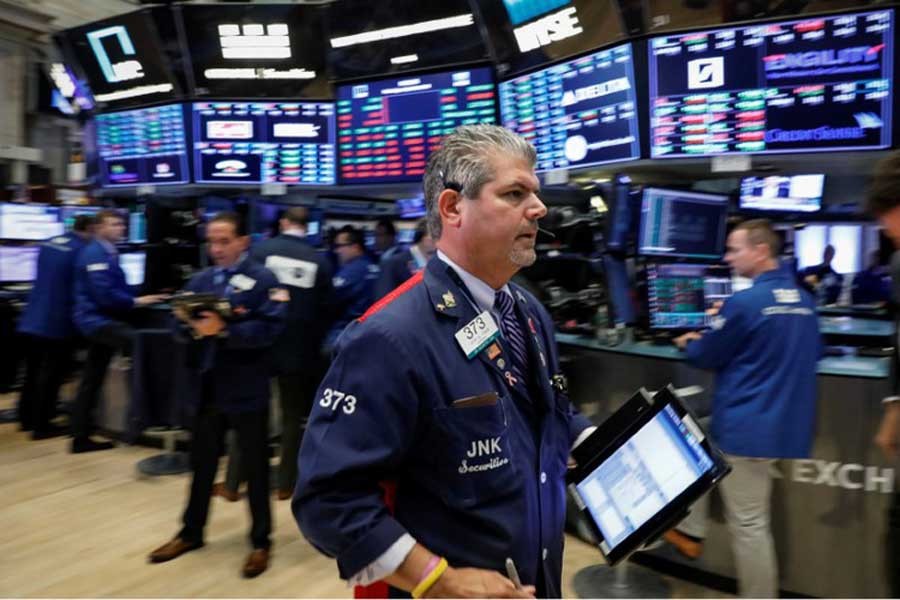A steep downturn in heavyweight Chinese internet stocks and recent weakness in half of the so-called FANG group have some investors worried that a key component of Wall Street’s near-decade long rally may be low on fuel.
Outstanding gains in Facebook (FB.O), Amazon (AMZN.O), Netflix (NFLX.O) and Alphabet (GOOGL.O) have underpinned much of the US stock market’s rally in recent years, along with the broader tech sector, but the group is widely viewed as overbought and valuations remain expensive.
Backed up by strong earnings growth and investor confidence in Silicon Valley’s innovation track record, the S&P 500 technology index .SPLRCT is up 16 percent in 2018, making tech Wall Street’s top performer.
But a recent slump in China’s own superstar technology stocks, brought into sharper focus after Tencent Holdings (0700.HK) reported its first profit drop in almost 13 years on Wednesday, has increased worries about Wall Street dependence on a handful top-shelf growth companies.
Shares of Tencent, China’s largest social media and gaming company, have fallen over 6 percent in the past two days and are down by nearly a third from their record high close in January.
“Tencent is a good proxy for global growth and risk. Nowadays, with everything being so momentum driven in the market, if one thing goes, everything can go,” said Wedbush Securities senior trader Joel Kulina.
Also unnerving tech investors: Netflix and Facebook, which along with Amazon and Google-parent Alphabet make up the FANG stocks, have fallen sharply since their June-quarter reports.
With Netflix down 22 per cent from its record high close in early July, and Facebook down 19 per cent since July 25 due to fallout from privacy scandals, some investors are questioning whether “FANG” may be turning into “AG”. Even with those worries, investors continue to make the group a centrepiece of their portfolios.
Amazon has surged over 60 per cent in 2018 and on Tuesday closed at a record high. Alphabet is up 17 per cent year to date.
“FANG will continue to play a huge role over the next two to three years,” said Jake Dollarhide, chief executive officer of Longbow Asset Management in Tulsa, Oklahoma. “They’re expensive, but you have to hold your nose and buy them.”
The S&P 500 in recent days has struggled just short of its January record high and is up 6.0 per cent year to date.
Even after recovering from a steep sell-off in February, the S&P 500 is trading at a relatively inexpensive 16.5 times expected earnings, compared to 18.6 times earnings in January, according to Thomson Reuters data. The S&P 500 technology index is trading at 18.7 times earnings, compared to its high-point of 19.6 in late January.
The FANG stocks, plus Apple and Chinese stocks Baidu, Alibaba and Tencent, in August were the most crowded trade on Wall Street for the seventh straight month, according to survey of fund managers by Bank of America.
In crowded trades, most investors share the same opinion, increasing the potential for a volatile sell-off if sentiment changes.
Shares of US-listed Chinese technology companies in recent years have been caught up Wall Street’s tech rally, but changes in their prices can also reflect the outlook for China’s economy and government regulation.
With China investors also worried about potential fallout from a trade war between Beijing and Washington, Chinese internet heavyweights Baidu (BIDU.O) and Alibaba (BABA.N) have fallen 11 per cent and 7.0 per cent since the end of June, respectively. US-listed shares of Baidu and Alibaba both rose more than 1.0 per cent on Thursday following selling earlier in the week.
Facing losses on China tech trades, global investment funds that own those stocks may be tempted to sell some of their US tech stocks to lock in profits, Reuters reported.
“Over time, the breadth of the market tends to narrow, you have smaller leadership groups and once they begin to roll over, which perhaps Tencent is telling us is about to happen, then the broader markets have more of a reason to sell off,” said Peter Cecchini, managing director and chief market strategist at Cantor Fitzgerald in New York.
Amazon recently traded at 87 times expected earnings, its lowest in over a year. But many investors focus on the Internet retailer and cloud infrastructure company’s explosive revenue growth. By that measure, Amazon appears expensive, at 3.5 times expected revenue, its highest level ever, according to Thomson Reuters data.


